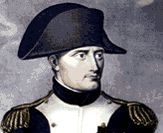 |
 |
 |
Napoleon Bonaparte (3)Emperor of France 12
Portraits of Napoleon Bonaparte
He also got France back in to the good books of Rome through the Concordat with the Pope, which eased the restrictions and penalties imposed on the church by the Revolution. Bonaparte's popularity was now unprecedented and he was voted Consul for life. Setting about much-needed civil reforms he turned upside down the old system of running France and introduced the Civil Code. But all was not safe for Bonaparte and there were several attempts on his life, including a bomb set off in Paris as his carriage went by. Still, in 1804, the general felt confident and secure enough to declare himself Emperor and the next day created the Marshalate for his most trusted and talented soldiers. Bonaparte waited until 2 December for his coronation where, with much pomp and ceremony, he crowned himself. While affairs within France were on a high, Bonaparte committed a serious error when the determined Duc d'Enghien, a Royalist figurehead, was kidnapped from neutral Baden, tried without a lawyer defending him and then executed. The event turned Europe's monarchies forever against him and led to the formation of the Third Coalition to try to bring down his regime. Bonaparte reacted by amassing a huge army - the first Grande Armee - on the coastline of Europe with the intention of invading Britain but, fortunately for those opposing him, he was never given the opportunity as Admiral Horatio Nelson smashed his naval ambitions at Trafalgar in 1805. While his political radar may have been off with the D'Enghien affair, his military one was not and knowing his enemies were mobilising against him he prepared a pre-emptive strike. Secretly redeploying the 200,000-man Grand Armee, Bonaparte had them march by various routes until they were in striking distance of Austria's General Mack, who was waiting at Ulm for the arrival of the Russian army under General Kutusov.
|
||
|
Napoleon
Bonaparte
|
|
| Career | Portraits |
| Quotes | Family |
| Loves | Letters |
| Plots | Murdered? |
| His will | Places |
|
Era
of Napoleon
|
|
| Powers | Opponents |
| Coalitions | Allies |
| People | Timelines |
| Key sites | Shrapnel |
|
Warfare
|
|
| Campaigns | Battles |
| Armies | Generals |
| Marshals | Winners |
| Glossary | Medical |
| Weapons | 1812 War |
| Uniforms | Battlefields |
|
War
at Sea
|
|
| Naval War | Heroes |
| Artworks | Signals |
| Nelson | Trafalgar |
|
Maps
|
|
| Key Maps | Peninsula |
| Animated | 1796/1800 |
| 1809 | Russia |
|
French
Revolution
|
|
| Revolution | Guillotine |
| Posters | People |
|
Art,
Film, Games
|
|
| Education | Goya |
| Sharpe | Hornblower |
| Books | Movies |
| DVDs | Music |
| Wargames | Images |
| Cartoons | Caricatures |
|
Other
|
|
| About Us | Sources |
| Awards | Sitemap |
| Links | Militaria |
| Miniatures | Reenactors |
| Forum | Quizzes |
| Home | Waterloo Diorama |
|
Napoleonic
Auctions
|
|
| General | Miniatures |
| Militaria | |
 Together
with the victory at
Together
with the victory at